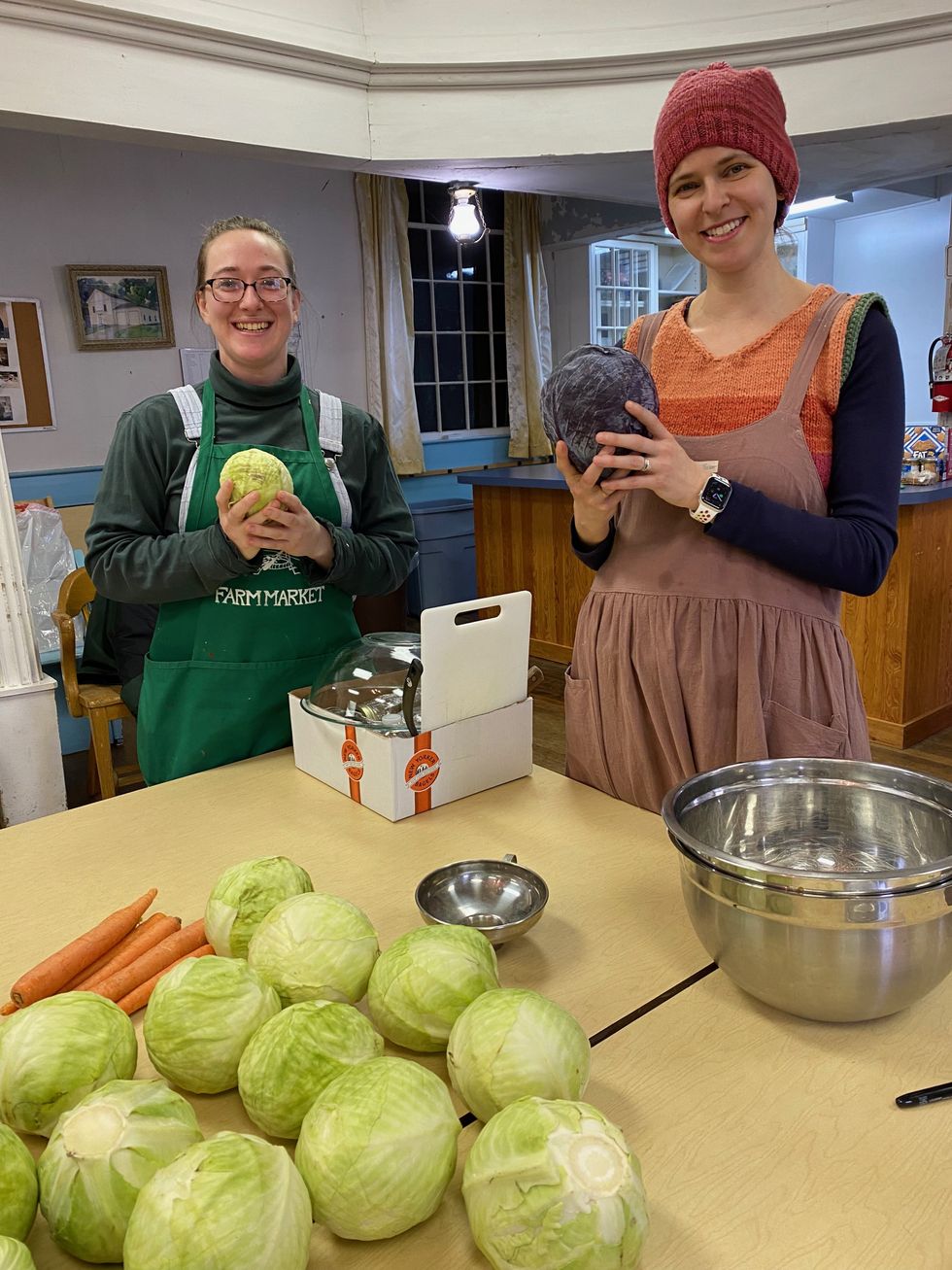Krauting class turns cabbage into sauerkraut

Workshop instructor Tal Hadani-Pease, at right, and assistant Margaret Hopkins.
Photo by Leila Hawken

Lacto-fermentation in action was the focus of the day at Taghhannuck Grange No. 100 in Sharon, Conn., as attendees learned the relatively easy, but muscular, process of turning cabbage into sauerkraut and using the same salt-brine method to preserve other farm vegetables on Thursday, Jan. 26. Nearly a dozen attended, eager to experience the process.
Not the same as canning, and thought to be easier, the sauerkraut session was led by Tal Hadani-Pease in coordination with Cornwall’s Motherhouse, Inc. The event was one of a life skills series of workshops that had taken a hiatus during the pandemic.
“I started taking workshops at Motherhouse,” Hadani-Pease said. “The more I learned, the more I wanted to learn, and now I’m teaching,” she added. Motherhouse is a Cornwall, Conn., based organization under the leadership of Debra Tyler of Local Farm who also serves as Grange chaplain.
Lacto-fermentation is a simple fermentation process requiring nothing more than salt and vegetables—no fancy equipment. Participants needed to bring a bowl, knife, spoon, cutting board, and empty jars. Cabbages and salt were furnished. The whole cabbage-to-jar process took about 30 minutes.
The essential workers in the fermentation process are the lactobacillus bacteria, already present in and on all people and all surfaces, absolutely everywhere, Hadani-Pease explained. There are heroes and villains among those bacteria. The bad bacteria cannot tolerate the salt in the process, but the good bacteria can and do. The salt brine eliminates the bad bacteria to enable the good bacteria to interact with the natural sugars found in cabbage and other farm vegetables and proceed with the beneficial work that the lactic acid (natural preservative) is doing to create the delicious product, such as sauerkraut in the case of the workshop’s cabbage.
The salt-brine fermentation process dates back 2,000 years to the ancient Chinese as an early means of food preservation, Hadani-Pease noted.
Diving into the first step, participants sliced and chopped their cabbage. Among the first to complete that step was Peter Jensen of Falls Village, Conn., with experience as a professional chef, working with an appropriately sharp knife and a practiced technique.
“If you curl your fingertips under, you never cut your fingers,” Jensen advised.
Using Celtic sea salt with high mineral content, Hadani-Pease explained the measurements by weight for the right amount of salt at 2% against the weight of the cabbage. She said her kitchen scale remains a valuable tool.
The next step involved vigorous pounding of the cabbage and the salt, intended to bruise the cabbage and beat it down in volume while the salt drew out its natural sugary liquid to create the brine.
Tightly packing and weighing the beaten cabbage into jars was the final step. All were advised to “burp” their jars each day as the fermentation process did its work, lest the jar explode. At the end of seven days, the sauerkraut would be ready for a tasting.
Tyler indicated that more life skills workshops are likely to follow, although none has been scheduled at present.
Farmland in the Northwest Corner, where family farms rely on Public Act 490 to keep land in agricultural use
NORTH CANAAN — Concerns mounted last week across the state and Northwest Corner that proposed farmland tax increases could threaten the future of working farms. In response, owners of large agricultural tracts warned that higher property tax assessments would make it impossible to continue operating under the same rules as residential development.
Those concerns — echoed by farmers who traveled to Hartford to testify and amplified by local lawmakers — prompted Gov. Ned Lamont to order an immediate halt to steep increases in farmland property tax assessments that critics said could push land out of agriculture and into more intensive use.
The 2025 revised land-use values were compiled by the state Office of Policy and Management, in coordination with the Connecticut Department of Agriculture, using landowner survey data collected as part of the five-year update process — a methodology farmers and assessors later said produced distorted results because of low participation and uneven data.
Lamont’s action followed a Jan. 15 press conference at the State Capitol organized by Connecticut Senate Republicans, where lawmakers stood alongside farmers to call attention to sharp valuation increases proposed under the state’s farmland tax program.
Senate Minority Leader Stephen Harding, R-30, whose district includes much of the Northwest Corner, played a leading role in bringing the issue to the forefront, warning that the reassessment threatened the economic viability of family farms across rural Connecticut.
Following pressure from Harding, local farmers, and a petition with more than 20,000 signatures, the governor agreed to pause the new, higher valuations and revert to 2020 levels.
At the press conference, Harding said farmers in his district and across the state were facing projected assessment increases of hundreds — and in some cases thousands — of percent under new land-use values developed by the state.
“This isn’t about tax avoidance,” Harding said at the time. “This is about whether family farms can survive when the rules change overnight.”
Farmers attending the event echoed those concerns, saying sudden jumps in assessed values could translate into tax bills they could not absorb while continuing to operate.

The most controversial proposal would have increased the value of swamp land from $40 an acre to $970 an acre. That increase was later eliminated following public outcry, although other land categories in the new revaluation remained subject to significant tax hikes.
“Unforeseen lack of data” to blame
Lamont said in a statement, “Due to an unforeseen lack of data in establishing assessment values for these lands as required, significant increases in valuations occurred for the tax years beginning with the 2025 grand list.”
Only about 4% of the state’s farmers contributed survey data for the revaluation, according to state officials.
To address the problem, the governor directed OPM, in consultation with the Connecticut Department of Agriculture, to revoke the 2025 Recommended Land Use Values and Best Practices for farmland, forestland, open space and maritime heritage land, and reinstate the 2020 recommended land use values for these categories.
The governor also ordered immediate notification to all municipal tax assessors of the revocation and reinstatement, and mandated that a working group be convened in collaboration with the state department of agriculture, including representation from agricultural organizations, farmers, municipal leaders and assessors.
What triggered the concern?
The dispute centers on Public Act 490, the state law that allows farmland, forestland, and open space to be assessed for property tax purposes based on its current use rather than its fair-market value.
The law is intended to reduce pressure on landowners to sell to developers and to keep working landscapes intact.
Every five years, the state develops recommended land-use values that municipalities may use when setting assessments. In late 2025, updated values released by the Department of Agriculture and OPM would have significantly increased assessments in several farmland categories, prompting alarm from farmers and assessors alike.
Although the state revised the figures earlier this month after hearing concerns, many landowners said the updated numbers still represented dramatic increases.
In the Northwest Corner — where farms are often land-rich but cash-poor — farmers warned that higher assessments could limit reinvestment, complicate succession planning or push land toward subdivision or other non-agricultural uses.
Benjamin Freund of East Canaan said the proposed changes would have had a direct and immediate impact on his family’s farming operation, which comprises 455 acres enrolled under Connecticut’s farmland tax program.
“It would have impacted us, as we have all of our acres — minus the houses — under PA 490,” Freund said. “We have every land classification, from tillable acres to swamp and woodlands. PA 490 is a critical tax relief program that allows us to farm large tracts and be taxed according to the use. We could not afford to plant corn and have the same property tax as a house lot.”
Freund said his family has operated for decades under PA 490 and described the program as essential to keeping farmland in production in Connecticut.
“We could not farm in Connecticut without it.”
He said landowners are periodically surveyed to provide the raw data used to determine updated land values, but said low participation contributed to distorted results in the most recent valuation cycle.
“The Connecticut Farm Bureau recognized the issue and worked with the Department of Agriculture to address the concern.”
The third-generation Freund Farm, operated by Ben and Matt Freund, rents land and barns to Canaan View Dairy, operated by Ethan Arsenault, who owns the cows and grows the crops.
Jennifer Dubray, assessor for North Canaan, Kent and Sharon, said the governor’s action will not require changes to the current grand lists in those towns.
“The PA 490 values in those towns were all established using the latest values provided by the Office of Policy and Management at the time of their respective revaluations,” Dubray said. “In North Canaan, the revaluation took place in 2022 and utilized the 2020 values. For Kent and Sharon, the revaluations occurred in 2023, so the 2020 values were also used.”
“Consequently,” she said, “it will not be necessary to make any changes to the 2025 Grand List for these towns.”
Farmers’ input sought
In addition to directing OPM to immediately notify municipal assessors that the 2020 land-use values are back in effect, Lamont also ordered the creation of a working group that will include farmers, municipal officials, assessors, and state agencies to review the valuation process and recommend improvements before the next five-year reassessment cycle.
Harding said the governor’s action was an important first step but emphasized that longer-term reforms may be needed to ensure transparency and predictability.
“This pause gives farmers breathing room,” Harding said. “Now we need to make sure the system going forward reflects real-world farming conditions.
The Salisbury town crew out plowing and salting Monday morning.
FALLS VILLAGE — A powerful winter storm dumped more than 18 inches of snow in parts of the Northwest Corner of Connecticut Sunday, Jan. 25, testing town highway departments that were well prepared for the event but already straining under the cost of an unusually snowy season.
Ahead of the storm, Gov. Ned Lamont declared a state of emergency and urged residents to avoid travel as hazardous conditions developed Sunday and continued into Monday. Parts of the region were hit with more than 18 inches, according to the National Weather Service, with heavy, persistent bands falling all day Sunday and continuing into Monday morning.
Schools, municipal offices, churches and numerous community events were canceled or postponed through Monday as plowing operations continued and temperatures dropped into the single digits overnight.
Despite the severity of the storm, local officials said preparation efforts helped keep roads passable and emergency services operating — though many towns acknowledged the financial toll of repeated storms this winter.
“In December, we had seen as much snow as all of winter last year,” North Canaan First Selectman Jesse Bunce said Friday, before the storm arrived, citing conversations with his highway crew. “Our salt budget is getting thin, and costs like this are tough. But we have to do it no matter what happens. Public safety comes first.”
Bunce said the town had likely exceeded its snow-removal budget even before the weekend storm. Crews logged nearly 30 hours during the Jan. 17–18 weekend alone, he said, after back-to-back storms required repeated plowing and salting.
“A typical snowstorm might mean a four-hour route for our crews — three or four inches that stops overnight, allowing them to head out early in the morning,” Bunce said. “But when storms drag out, it really lengthens the work.”
North Canaan employs four full-time highway workers, with an additional employee on call for larger storms. Bunce said the town has some reserve funds and expects to shift money within the budget to cover overruns.
Falls Village First Selectman Dave Barger said his town is facing similar pressures.
“We will be over budget,” Barger said Friday. “We have used more salt this season than we used all last year — and we’re only halfway through the winter.”
Several officials pointed to a recent rain-to-freeze cycle as particularly costly, turning snow into inches of ice that required heavier treatment. Some towns adjusted their salt usage by mixing materials to conserve supplies. North Canaan, for example, has used a blend of roughly two-thirds salt and one-third sand, Bunce said. Salt currently costs about $120 per ton, compared to roughly $20 per ton for sand.
Kent First Selectman Eric Epstein said his town entered the storm well stocked and operationally ready. “The highway department has been busy and has gone through a lot of material this year,” Epstein said Friday. “We’ve had deliveries, we’re well stocked, and the trucks are in good shape. There has been an increase in costs, but so far, it’s within the budget. We’ll see if this pattern continues.”

Salisbury First Selectman Curtis Rand said Thursday that highway crews were prepared, while Sharon First Selectman Casey Flanagan also reported that his town had taken steps to be ready for prolonged snowfall and extreme cold.
Beyond road conditions, the storm triggered broader cold-weather planning at the state level.
On Wednesday, Jan. 21, Lamont’s office announced that Connecticut’s Cold Weather Protocol would go into effect ahead of the storm’s arrival, activating coordination between state agencies and municipalities.
The protocol is designed to protect vulnerable populations during periods of life-threatening cold, including arranging transportation to warming centers and shelters when needed. Residents seeking shelter were urged to visit 211ct.org or call 2-1-1 for assistance.
Municipalities also reached out directly to residents. The Town of Cornwall circulated an advisory email urging people to check on neighbors and vulnerable residents and reminding them of the town’s Storm Safety Check-In program, which provides advance notice of major weather events and wellness checks when necessary.
As crews continued plowing into Monday, local leaders said the storm underscored both the importance — and the growing cost — of winter preparedness.
"A year like this, with so much activity, it’s inevitable,” Bunce said. “We anticipate going over budget. But we’ll take it as it comes and keep the roads safe.”
With additional reporting by Patrick L Sullivan
CORNWALL — At the recommendation of the Cornwall Volunteer Fire Department, on Jan. 20 the Board of Selectmen voted to move forward with the purchase of two new trucks.
Greenwood Emergency Vehicles, located in North Attleboro, Massachusetts, was chosen as the manufacturer. Of the three bids received, Greenwood was the lowest bidder on the desired mini pumper and a rescue pumper.
CVFD’s Ian Ridgway sat on the truck committee and said Greenwood was not just chosen for the price, but also for the design of each vehicle. He said their models had a shorter wheelbase and more ground clearance, as well as extra storage space on board, compared to the next best bid.
After $100,000 in discounts offered by Greenwood, the combined purchase price for both vehicles was shown to be $1,200,408. The delivery time was estimated at 15 months.
CVFD raised $600,000 during its recent fundraising campaign, of which $500,000 will be given to the town to buy the trucks. That figure will be paired with $720,000 in town truck fund reserves. The additional donated funds will be used to outfit the trucks with equipment and tools.
“I want to praise the town of Cornwall,” said CVFD President Dick Sears. “We’re able to buy these beautiful new pieces of equipment courtesy of the tremendous citizenry of this town.”
FALLS VILLAGE — Robin Lee Roy, 62, of Zephyrhills, Florida, passed away Jan. 14, 2026.
She was a longtime CNA, serving others with compassion for more than 20 years before retiring from Heartland in Florida.
Robin loved the beach, sunshine, and gardening, and was known for her strength, humor, and unwavering support of those she loved.
She is survived by her daughter, Sierra R. Zinke, and brothers, Darren Roy and Todd Roy.
She was preceded in death by her parents, Sharon Thomkins Roy and Robert Roy, and her brother Nevin Roy.
No services will be held at this time.